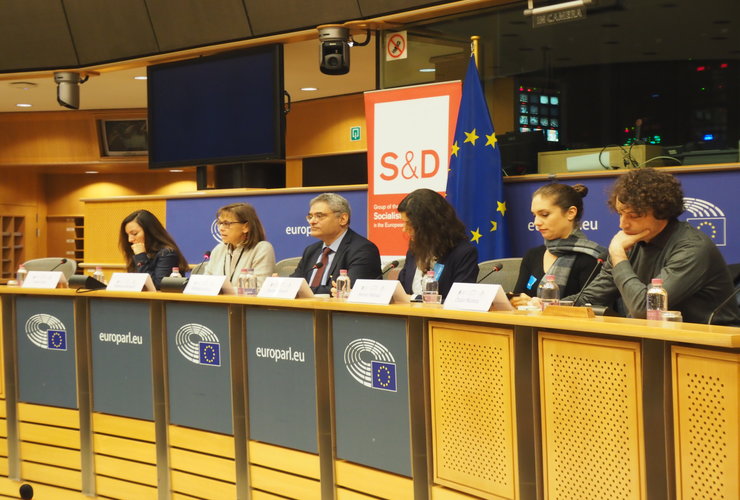The European Union should end a “futile” and “adversarial” debate on Turkey and instead focus on creating dialogue and providing financial support for independent journalists and civil society in the country.
That was the message shared by Turkey-based journalists at the panel discussion “Turkey: How the EU can support press freedom and uphold democracy” at the European Parliament in Brussels on Dec. 6. The discussion was organised by the International Press Institute (IPI) in partnership with the European Foundation for Democracy (EFD).
The EU’s role in supporting media freedom and fundamental rights in Turkey was examined by three well-respected independent journalists currently working in Turkey: freelance journalist and former CNN Türk anchor Nevşin Mengü; lecturer and Cumhuriyet columnist Özgür Mumcu; and BBC News Turkey correspondent Selin Girit.
The three panelists agreed that EU had lost much of its power to affect the situation in Turkey, where more than 150 journalists are currently behind bars.
”Most of the people in Turkey have lost trust in the EU,” Girit said, addressing a sizable crowd of MEPs, journalists and civil society representatives. ”They have given up hope that things may change for the better in terms of the accession negotiations.”
She added: “As a journalist in Turkey, I would have liked the EU to act as an anchor for democratic reform in Turkey like it used to do before. That is not the case anymore: the EU has become an irrelevant topic.”
There was also agreement among the speakers that the rule of law in Turkey had collapsed. They noted that the pattern of jailing and prosecution of journalists – which dramatically worsened following the July 2016 coup attempt – had led to pervasive self-censorship.
Nevertheless, Mumcu highlighted positive actions by individual MEPs, such as observing the trials of journalists with Cumhuriyet, Turkey’s leading opposition newspaper.
“People being present at the court sessions shows us that we are not alone and that people are watching and that they are aware of what is going on,” he said. “It shows Europe is concerned.”
Still, the panellists warned about creating more division between EU and Turkey.
“Whenever the EU takes a hard stance concerning Turkey, the [Turkish] government uses it for internal purposes,” Mumcu said.
Girit added: “European politicians use Turkey as a tool to appeal to domestic audiences during elections. Turkey bashing is popular, but where does that lead us?”
Greek MEP Miltiadis Kyrkos, a member of the Group of the Progressive Alliance of Socialists and Democrats in the EU Parliament and the host of the event, said he was not sure the Parliament currently knew what to do with Turkey.
But he emphasised that officials should avoid a “useless debate” on cutting Turkey’s pre-accession funds or freezing Turkey’s EU accession negotiations – which, he noted, “are already practically at a standstill”.
One idea that was floated in the discussion was gradually opening up accession negotiations to tackle one of the biggest issues in Turkey: the erosion of the rule of law.
Girit said she understood that the EU was sceptical of the “Erdoğan government ever upholding democratic standards” but expressed hope for a middle way.
“Opening accession would actually push Turkey to reform the judiciary system, for example,” she suggested.
Kyrkos supported the idea of using the accession funds – around four billion euros – to support civil society and media in the country.
“What we can do, besides being physically present in Turkey and pushing the dialogue forward, is using these funds,” he said. “We can channel them to specific projects. It is a good and effective tool.”
Girit said that the EU should take a closer look at the fund, which is intended to support democratisation, rule of law and fundamental rights in Turkey.
“Could some of that money be used to support, say, independent journalism?” she asked, emphasising the situation of independent press in the country.
“There are thousands of journalists who were sacked from their jobs in the last year. They could use some sort of a fund, some support, to make sure that opposition voices are heard in the country as well.”
